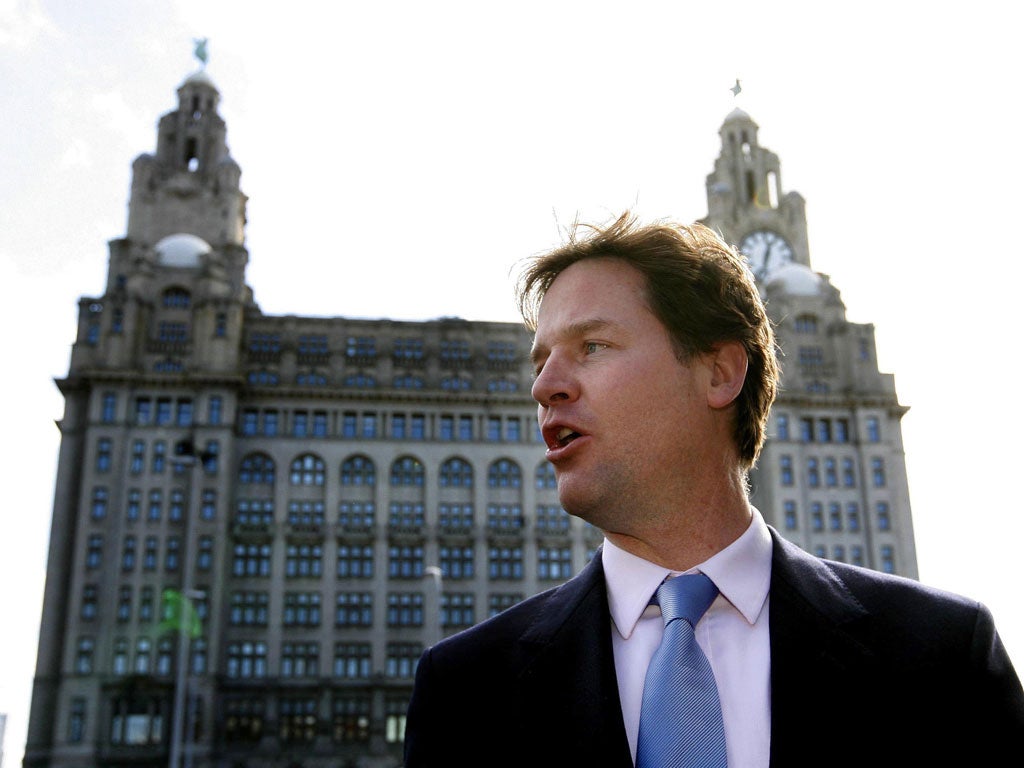Lib Dems in disarray as fewer candidates contest elections
Collapse in activist base over NHS reforms and civil liberties sparks fears for 2015 contest

Your support helps us to tell the story
From reproductive rights to climate change to Big Tech, The Independent is on the ground when the story is developing. Whether it's investigating the financials of Elon Musk's pro-Trump PAC or producing our latest documentary, 'The A Word', which shines a light on the American women fighting for reproductive rights, we know how important it is to parse out the facts from the messaging.
At such a critical moment in US history, we need reporters on the ground. Your donation allows us to keep sending journalists to speak to both sides of the story.
The Independent is trusted by Americans across the entire political spectrum. And unlike many other quality news outlets, we choose not to lock Americans out of our reporting and analysis with paywalls. We believe quality journalism should be available to everyone, paid for by those who can afford it.
Your support makes all the difference.Fears that NHS reforms, tuition fees and state incursions into civil liberties have damaged Nick Clegg's hopes at the next general election are fuelled today by figures showing that the Liberal Democrats are not fielding candidates in key town hall battles on polling day next month.
Analysis of nominations for the local elections on 3 May seen by The Independent on Sunday shows that 1,198 fewer candidates are standing for the Lib Dems than for Labour in England, Wales and Scotland.
The figures suggest that the Lib Dems' activist base has been severely curtailed as a result of its coalition with the Conservatives, with fewer candidates ready to wear a yellow rosette and defend the Government's policies on the doorstep than in recent memory.
In four of the key metropolitan council elections on 3 May, the Lib Dems do not have a "full slate", while in five other town hall battles in England they are fielding no candidates at all. Lib Dem candidates are "missing" in wards in a further 49 councils in England.
Mr Clegg's party has not put forward a full slate in Liverpool, where the Lib Dems were in control until two years ago, including wards where the party's vote has been previously strong. They are also short of a full contingent in Leeds, where the Lib Dems held joint control until last year, and in Manchester and Birmingham – all formerly rich hunting grounds in the north of England for what MPs and councillors regard as the "party of local government".
With the close of nominations last week, figures show that the Lib Dems are putting forward 1,552 candidates in England, compared to 2,120 for Labour and 2,151 for the Tories. In Wales the Lib Dems are fielding 281, compared to Labour's 662 and the Tories' 424 – although the party is traditionally less strong here. In Scotland, they are fielding 245 compared to 494 Labour candidates and 360 Tories.
The collapse in numbers is not thought to be as a result of lack of money, because, unlike at general elections, there is no financial cost to stand for a seat. Party insiders blamed widespread disenchantment with the Lib Dem leadership and ministers, who have agreed coalition policies on reform of the NHS and higher tuition fees. While Mr Clegg has fought to temper a backlash over state monitoring of individuals' use of the internet by insisting he has won a consultation on the proposals, deep concern over civil liberties is spreading through the party grassroots. A letter signed by 157 activists to the party's president, Tim Farron, warned that Mr Clegg was putting at risk the core identity of the Lib Dems by supporting the "snooping" plans.
There are also anecdotal reports of activists and councillors resigning and standing as independents.
Toby Perkins, Labour MP for Chesterfield, said: "With the Lib Dem betrayal on the NHS, on benefits for the disabled and on tuition fees to pay for a tax cut for millionaires, everyone is wondering what they stand for. So it's hardly surprising that they are struggling to find anyone willing to stand for them.
"The 'party of local government' is being abandoned by their base. This is a serious warning for Mr Clegg that if he doesn't change course, it will be the end for them as a major party."
Benjamin Ramm, editor of The Liberal, which unofficially represents the party's traditional grassroots, said: "It is more difficult than at any other time in the past two decades to find people in Liverpool and Leeds who are willing to stand with a yellow rosette and pound the streets on a cold Tuesday evening. The NHS reforms, tuition fees, the rise in VAT – a lot of this is very difficult for grassroots activists to defend."
A spokesman for the Liberal Democrats admitted that the local elections were going to be "difficult" for the party, adding: "The last time we had made gains in the local elections was back in 2008, and we have taken a bit of a hit since then. We fielded fewer candidates last year and the year before. But we are fielding candidates across the country. We are hoping this is the point where we will start to rebuild ahead of 2015 and beyond that.
"Things are inevitably more difficult this year. But we are still fighting extremely hard."
Membership of the Lib Dems has fallen steadily during the past decade from more than 73,000 in 2001 to 58,000 in 2009, although Mr Clegg's popularity during the 2010 election campaign, sparked by his performance in the TV leadership debates, caused a sharp increase to 65,000. But since the party has been in government, membership has fallen again.
Join our commenting forum
Join thought-provoking conversations, follow other Independent readers and see their replies
0Comments